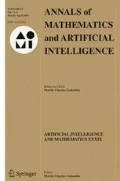Abstract
This paper is an attempt to clear the following charge leveled against preference logics: preference logics rest upon the mistaken belief that concept construction can satisfactorily be carried out in isolation from theory construction (J. Mullen, Metaphilosophy 10(1979)247–255). We construct a logic of preference that is fundamental in the sense that it does notcommit itself to any allegedlyobvious or intuitive — and in actuality,theory specific — preference principles. A unique feature of our construction is that preference orderings are placed upon possible worlds. While this has been done before in the work of S.O. Hansson and N. Rescher, among others, we do not derive a binary preference relation — from these orders — that acts on individual propositions. Instead, we provide the syntactic means to impose the preference orderings among worlds. Thus, unlike Hansson, we do not need to assumea priori that our preference orderings be transitive. Such properties can be axiomatized. The close connections between preferences and obligations, in particular their normative nature, then allow us to derive a deontic logic that is free of the paradoxes of standard deontic logic. It is interesting to note here that this work arose in an attempt to provide a logical characterization of document description and layout Layout directives can be succinctly represented as preference criteria.
Similar content being viewed by others
References
L. Åqvist, Deontic logic, in:Handbook of Philosophical Logic, ed. D. Gabbay and F. Guenthner (Reidel, 1984) pp. 605–714.
B.F. Chellas,Modal Logic, An Introduction (Cambridge University Press, 1980).
J. Garson, Quantification in modal logic, in:Handbook of Philosophical Logic II, ed. D. Gabbay and F. Geunther (Reidel, 1984).
S.O. Hansson, A new semantical approach to the logic of preference, Erkenntnis 31(1989)1–42.
D. Harel,First-Order Dynamic Logic, Lecture Notes in Computer Science 68 (Springer, 1978).
I.L. Humberstone, Inaccessible worlds, Notre Dame J. Formal Logic 24(1983)346–352.
A.J. Jones and I. Pörn, Ideality, sub-ideality and deontic logic, Synthese 65(1985)275–290.
V. Lifschitz, Pointwise circumscription: Preliminary report, in:AAAI86 (1986).
B. Loewer and M. Belzer, Dyadic deontic attachment, Synthese 54(1983)295–318.
L.T. McCarty, Permissions and obligations, in:IJCAI83 (1983) pp. 287–293.
J. Mullen, Does the logic of preference rest on a mistake? Metaphilosophy 10(1979)247–255.
V.R. Pratt, Process logic, in:6th Annual ACM Symp. on the Principles of Programming Languages (1979).
N. Rescher,Topics in Philosophical Logic (Reidel, 1968).
G. Sayre-McCord, Deontic logic and the priority of moral theory, Noûs 20(1986)179–197.
J. van Benthem, Correspondence theory, in:Handbook of Philosophical Logic II, ed. D. Gabbay and F. Guenthner (Reidel, 1984) pp. 167–247.
R. van der Meyden, The dynamic logic of permission, in:Logic in Computer Science (1990) pp. 72–78.
B. Vermazen, The logic of practical ought-sentences, Philos. Studies 32(1977)1–77.
G.H. von Wright,The Logic of Preference (University of Edinburgh Press, 1963).
Author information
Authors and Affiliations
Rights and permissions
About this article
Cite this article
Brown, A.L., Mantha, S. & Wakayama, T. Exploiting the normative aspect of preference: A deontic logic without actions. Ann Math Artif Intell 9, 167–203 (1993). https://doi.org/10.1007/BF01531266
Issue Date:
DOI: https://doi.org/10.1007/BF01531266




